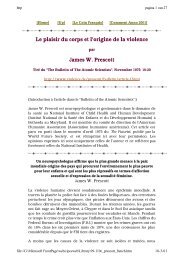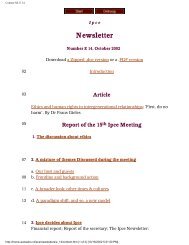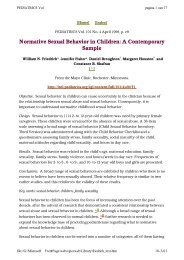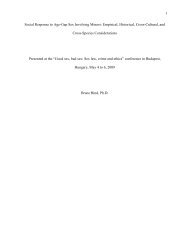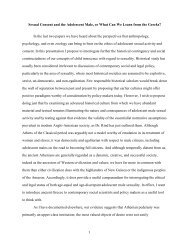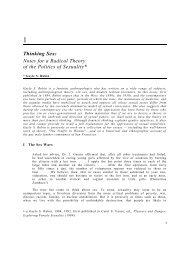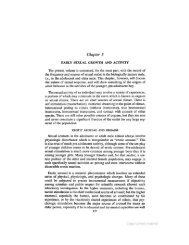Infant and Child Sexuality: A Sociological Perspective - Ipce
Infant and Child Sexuality: A Sociological Perspective - Ipce
Infant and Child Sexuality: A Sociological Perspective - Ipce
Create successful ePaper yourself
Turn your PDF publications into a flip-book with our unique Google optimized e-Paper software.
IV. A FEW WORDS OF MY OWN<br />
It is good to let all children (not only those brought to the clinician<br />
with behavior problems) speak for themselves about their own<br />
sexuality. In the preceding pages I have let children--infants through<br />
preadolescents--speak for themselves as much as possible with only the<br />
minimum of required interpretation. I have been constantly aware <strong>and</strong><br />
motivated by the desire to provide an alternative, a balance so to<br />
speak, to the preponderance of works that have stressed the pathology<br />
in infant <strong>and</strong> child sexuality. These works often contain direct testimony<br />
from children with serious sexual problems who have been referred<br />
to child guidance clinics or private practitioners. This limited testimony<br />
from a small sample of atypical children supports a heavy superstructure<br />
of professional analysis, interpretation, <strong>and</strong> generalization.<br />
My role has been that of organizer <strong>and</strong> facilitator--giving the young a<br />
chance to speak, <strong>and</strong> arranging their comments under appropriate topics<br />
<strong>and</strong> headings. Of course, not all children in the United States have<br />
spoken here, not even a representative sample, but a significant segment<br />
nevertheless. The statements of the young in the three preceding<br />
chapters represent the ebb <strong>and</strong> flow of human sexual experience among no<br />
less than 300 children brought up in a moderately repressive society.<br />
I will not summarize what they have said. Their remarks do not lend<br />
themselves easily to generalization <strong>and</strong> may be rendered trite in the<br />
process. I remind the reader that we were interested in insights, hopefully<br />
in depth, rather than in quantifying incidences.<br />
While working as a teacher <strong>and</strong> researcher among students for thirty<br />
years, I have formed some impressions about youth <strong>and</strong> human sexuality.<br />
These impressions are supported by my own empirical research <strong>and</strong> by<br />
what other students of human sexuality have observed. It is against<br />
this background that I base my few words of conclusion.<br />
Some parents in the United States continue to accept sexual repression<br />
in childhood, believing that it is right. While, at the other extreme,<br />
perhaps two percent (or is it five percent or ten percent?) of<br />
parents are permissive, seeing nothing wrong with sex play among children<br />
<strong>and</strong> not attempting to stop it. Would it be too bold to estimate<br />
that less than one percent of parents in the United States provide a<br />
wholesome atmosphere <strong>and</strong> positive education for the affectional-sexualerotic<br />
development of their children? The idea that man’s sexual nature<br />
is one of the aspects of human personality that needs to grow <strong>and</strong><br />
develop from infancy onward is slow in emerging.<br />
Our culture has gone to great extremes to emphasize the contrast in<br />
sexual nature between the child <strong>and</strong> the adult. The child is seen as<br />
sexless; the adult cherishes <strong>and</strong> esteems his sexual virility. Rather<br />
than continuous conditioning from infancy on, we practice discontinuous<br />
conditioning as far as sexual development is concerned. The “sexless”<br />
child is expected to revise his attitudes toward his body <strong>and</strong> its<br />
erotic-genital potential almost totally as he passes from child to<br />
132



